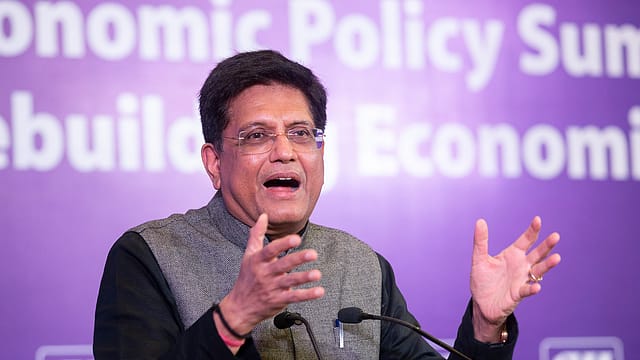Massive growth of e-commerce a matter of 'concern': Piyush Goyal
ADVERTISEMENT

Union Minister of Commerce Piyush Goyal, during his address at the launch of 'Assessing the Net Impact of E-commerce on Employment and Consumer Welfare in India' report today, said the massive growth of e-commerce could cause a "huge social disruption" in the country. He emphasised the need for a balanced approach to ensure "fair and equitable" growth for small retailers and e-commerce platforms. "I don't see it a matter of pride that half our market could become a part of the e-commerce network 10 years from now. It's a matter of concern," the minister says.
The Union minister says he does not deny that e-commerce has a role. "But we'll have to think very carefully and cautiously what that role is, how that role can be in a more organised fashion. Are predatory pricing policies good for the country?"
According to the minister, e-commerce is eating into the small retailers' "high-value, high-margin" products, which are the only products through which they survive. "What has happened to the corner store, the Mom and Pop stores? How many of them do you see surviving? Why did Switzerland not allow e-commerce to come in until very recently? Or in fact, even now, I think it's very limited."
January 2026
Netflix, which has been in India for a decade, has successfully struck a balance between high-class premium content and pricing that attracts a range of customers. Find out how the U.S. streaming giant evolved in India, plus an exclusive interview with CEO Ted Sarandos. Also read about the Best Investments for 2026, and how rising growth and easing inflation will come in handy for finance minister Nirmala Sitharaman as she prepares Budget 2026.
He said even e-commerce players like Amazon invest only to fill their losses and that it's not a reason to celebrate. "When Amazon says we are going to invest a billion dollars in India, we all celebrate. We forget the underlying story that that billion dollars is not coming in for any great service or any great investment to support the Indian economy. They made a billion-dollar loss in their balance sheet that year. They have to fill in that loss. If you make a Rs 6,000 crore loss in one year, does that not smell of predatory pricing to any of you?" the minister asked.
The minister says the e-commerce platform legally can't do business with consumers. "They create entities where Indians contribute to making those entities, sadly. Then They get caught, so they start closing down those entities. That's part two of the story. But they only reroute all the business through an entity to show that it's business to business. But the reality is all of you buy on these platforms, don't you? How do you buy it? B2C is not allowed on these platforms. How are they doing it? Should this not be a matter of concern for all of us?"
The Indian e-commerce industry has been on an upward growth trajectory. India's online retail sector, which stood at $70 billion in 2022, is expected to surge to $325 billion by 2030, according to a report by Deloitte Touche Tohmatsu India. As per Invest India, the national investment promotion and facilitation agency, close to 100% of pin codes in India have seen e-commerce adoption. "More than 60% of transactions and orders in India come from tier two cities and smaller towns."
